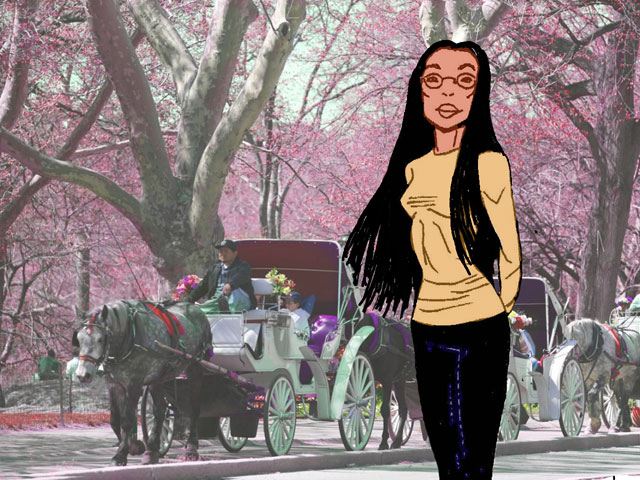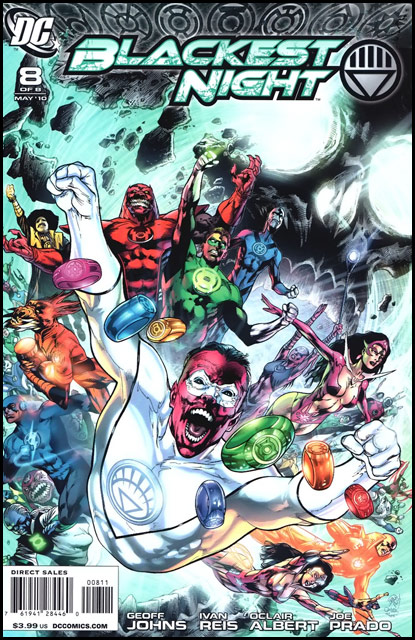(Originally posted on LiveJournal)
(For my friends, there are a couple of reasons I haven’t been posting much on LJ lately. The sore foot acquired at Wondercon at the beginning of April turned out to be plantar faciitis — distress of connective tissue in the foot, mostly on the underside. Early on, if I did nothing but lounge on the sofa with the foot elevated, it seemed fine, but the moment I put it down, pain returned. There’s not much one can do, except stretching and flexing, icing, and not stressing it. But it’s been a distraction. A second diversion has been the fact that I have been editing a bunch of short stories. The collection uses a set of characters a friend created for his graphic novels. He asked a number of his friends to write stories using the characters. And I volunteered to edit them in preparation of putting them together for a POD book. It’s been a lot of work — and I’ve learned that I really, really do not want to be an editor when I grow up. Oh, I can do it, and do it well, but I don’t get much joy from it. So, thems my excuses for not posting much.)

Recently I picked up, again, the novel Acacia, with an eye toward finally finishing the book. I started reading it well over a year ago. But it is a massive and dense book. And there is a lot to it, details vividly conveyed. But for some reason, I can’t read it straight through. I have to read this one in fits and starts.
But in getting back into it, I was struck by how I had no problem picking up the threads of the story. I know that part of this is because I do have a highly retentive memory. But I also credit the vividness of the author’s storytelling. He has made the world of the story real enough, detailed enough, that I have no problem remembering who the characters are, where they are, what’s at stake.
The phenomenon of getting back inside a story is something I have thought of occasionally before. I haven’t ever really had much problem doing that with a well written story. But I know that some people don’t like popping in and out of stories, feeling that it is too disjointed for them.
But what brought it especially to my mind this week were the events of the series finales of Lost and 24 on television. Here we have long stories told in “fits and starts”, and yet people seem to have no problem picking up the threads of the stories. Because they are engaged by the stories.
 On top of that, many of the people who were plugged into these stories are also plugged into other ongoing stories: other television stories, mega-stories in comic books (for instance the recent long Blackest Night from DC Comics), multi-volume novels. People have no problem distinguishing one story from another, nor do they insist that they can follow only one of any of the possibilities.
On top of that, many of the people who were plugged into these stories are also plugged into other ongoing stories: other television stories, mega-stories in comic books (for instance the recent long Blackest Night from DC Comics), multi-volume novels. People have no problem distinguishing one story from another, nor do they insist that they can follow only one of any of the possibilities.
So I started musing: specific stories are like pocket universes, and we enter them by some magical means. When we are inside the story space (especially when the story is well told and engaging), we have no problem remembering the details of that world as if they were indeed “real”. The characters are people we know well, the places are places familiar to us. When we exit the story, whether to take a break from it, or because the story is done, it is closed up behind us (a “closed book” in so many ways). We can open it again if we choose and re-enter it. But it doesn’t … extrude into our daily life, except in how the characters and events have touched us personally.
 But it strikes me as very wonderful that we humans are capable of “being part of” so many different pocket-universes. For myself, just on the spur of this moment, I can claim citizenship inside the story space of Tolkien’s Middle-earth, Doyle’s Sherlockian London, the realms of Howard’s Conan, the dark streets of Batman’s Gotham City, the corridors of Capt. Kirk’s Enterprise, the station levels of Babylon 5, the country homes and city residences of Georgette Heyer’s novels. And so many more. And they don’t leak into each other, except when we playfully throw them into the blender to see what sort of cocktail we can get by combining them.
But it strikes me as very wonderful that we humans are capable of “being part of” so many different pocket-universes. For myself, just on the spur of this moment, I can claim citizenship inside the story space of Tolkien’s Middle-earth, Doyle’s Sherlockian London, the realms of Howard’s Conan, the dark streets of Batman’s Gotham City, the corridors of Capt. Kirk’s Enterprise, the station levels of Babylon 5, the country homes and city residences of Georgette Heyer’s novels. And so many more. And they don’t leak into each other, except when we playfully throw them into the blender to see what sort of cocktail we can get by combining them.
I’m not really going anywhere with this rambling post. I’m just floating on a cloud overlooking the landscape of Storyland, and wondering how the various countries came about and why they so carefully maintain their borders — and why we are free to be citizens of all the countries, if we so desire.
I’m also a bit curious as to what pocket universes my friends are venturing into presently. Because many people I know often have multiple books “going” at the same time, even if there is one immediate one that is getting most of their attention. What worlds have you visited lately, and how well do you know the territory?
Just curious.
Comments
kalimac – May. 27th, 2010
The problem is that story spaces don’t operate by the same standards. And I don’t mean that they’re mutually inconsistent. I mean that they’re different the way that a great Picasso and a great Van Gogh and a great Rembrandt are great by different standards of greatness. Or the way you could say that an eight-year-old’s drawing is fabulous for an eight-year-old, but some work by Van Gogh is not Van Gogh at his best.
When I have Middle-earth actively in my head, all other fantasy worlds seem cheap and shoddy until I can shake it off and immerse myself, with the sole exception of the Valley of the Na.
scribblerworks – May. 27th, 2010
Yes! I think you’re right – jumping from story to story is rather like wandering a museum looking at pieces from various artists, right along with that eight-year-old’s drawing stuck on the refrigerator.
And I agree that Middle-earth does indeed take supremacy. Tolkien’s world-building is so thorough and yet engaging.
David Anthony Durham (the author of Acacia had previously written historical novels, and he was apparently very good working from established historical facts. He certainly brings that attention to detail to his fantasy writing. It’s almost overload.
sartorias – May. 27th, 2010
My own wouldn’t count (though I’ve slipped in and out for fifty years, now), so what does? The Vorkosiverse. I stepped into Herman Melville’s paradigm of earth, and stayed long enough to decide I don’t want to revisit it, so it will close behind me. I’m enjoying the America of West Wing because government actually works (what a fantasy!) and there are good people in it who can be effective. But then I drop over to NCIS.
I did try the world of 24, but I loathed it too much to stay there–your guts must be stronger than mine. Oh, how could I forget the LA of Chuck? *Love*
Just a few–this is already too blabbery.
scribblerworks – May. 27th, 2010
I think one’s own created world should count! I was certainly thinking of mine as I wrote the post.
That vividness of my own creation was something that struck me as part of this “being inside the story space”. I recently had the first two chapters of The Ring of Adonel critiqued by a writers’ group, and many of the comments addressed the vivid sense of place I had managed to convey.
Now, admittedly, those two chapters have gone through several fine-tuning revisions over the (ahem) couple of decades they’ve existed. But also, the particular place in the story, where most of the early chapters takes place, has been in my head for so long, I really do know it. But recently, I’ve finally moved the story into landscape I’ve only known before on a map. I suddenly realized how much I have relied on my artist’s approach, because I didn’t have as strong a sense of place in the new territory. I’m planning to address that by learning 3-D computer landscape modeling. I want to be able to “see” these places more vividly. I’m even considering (once I learn the program) offering an “imaging service” for other fantasy writers … but we’ll see how that shapes up after I’ve gotten the program and learned it.
😀
I had to read Moby Dick in college… and strangely enough the most vivid chapter to me was the one least connected to the actual story – it’s the one about rendering the whale blubber and the ambergris. I never got into West Wing myself, although I know it holds a lot of people. And certainly NCIS initially drew me in on the charms of Mark Harmon and David McCallum. But it’s also good storytelling. As for 24… it’s actually a strange case for me, because I think I was riding entirely on Kiefer Sutherland’s performance — so many of the characters around him don’t seem quite credible (what’s with all these moles regularly getting jobs in a counter-intelligence unit?). But Kiefer always “kept it real” in the character of Jack Bauer – or as real as you can get with what is essentially a comic book superhero. Heh… new worlds for me this year (or rather presently) are the Miami of Burn Notice and the Manhattan of Castle.
But this is a topic for blabbery, so no problem with that. In fact, that’s sort of the point — all these diverse places we go to in stories, some of which are incongruous. All in fun.
sartorias – May. 27th, 2010
Kiefer is good, but the show was too humorless for me, and also the cost in innocents dying pointlessly way too high. But degustibus.
I enjoyed Castle, and I loved season two of Burn Notice . . . I will get three when Netflix releases it, and I hope it’s not a repeat of two. The one I fell in love with was Chuck.
sartorias – May. 27th, 2010
Another thought, Melville is certainly at his best in Moby Dick, blending the real with the fictional world to give it added resonance.
However, I find that he has nothing to say to me in his subsequent stuff: I don’t find Bartleby the least bit funny (this is where “absurdism as comedy” and I totally part ways), and Pierre is an abysmally, almost unforgiveably ugly view of writers, what they write, what happens to what they write, and the world they write in.
jpantalleresco – May. 28th, 2010
bookwise I am currently reading the Alchemist by Pablo Coehlo. It’s not something I normally read but I’m enjoying it. I can kind of relate to seeking a treasure and journeying to unknown lands. I’ve done it many times.
Television Wise I’m watching episodes of Codegeass: Lelouche of the Rebellion. I’ve never watched a hero of a series be so diabolical. This series is epic and probably the best political show I’ve ever seen.
I’m rereading the Great Hunt by Robert Jordan as well. With him it’s watching how his world just ties together so well. It’s amazing to see how far in advance he planned things. A real master of his craft.
(Anonymous) – Jun. 30th, 2010
Your writing is brilliant Scribbler….
…but the thinking behind the writing is even more so.
“I’m not really going anywhere with this rambling post. I’m just floating on a cloud overlooking the landscape of Storyland, and wondering how the various countries came about and why they so carefully maintain their borders — and why we are free to be citizens of all the countries, if we so desire.”
🙂 Wow to the 5th power!!!!!
Indeed, walking on a cloud… is very easy on a sore foot.
Jim from Michigan
